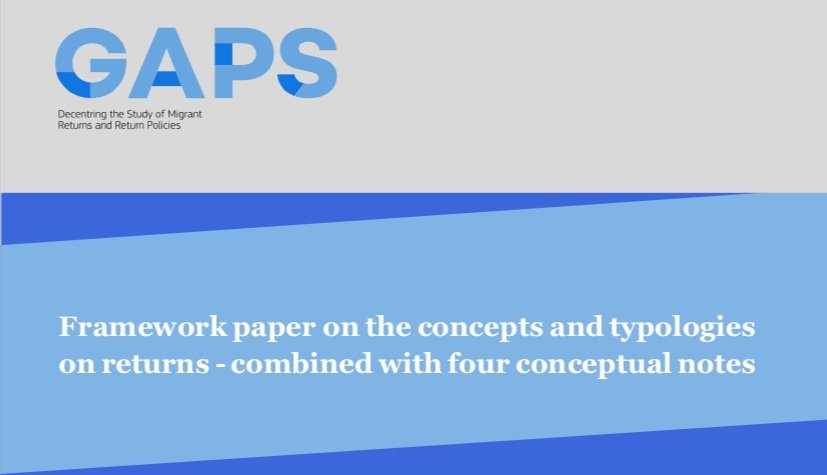Country Profile
GAPs Country Profile: Canada / Blog Posts
Canadian Return Policy and the Migration-Terrorism Nexus
by: Younes Ahouga, Toronto Metropolitan University
The creation of the current Canadian return policy is linked to the establishment of a common North American security perimeter with the United States following the terrorist attacks of 11 September 2001. To deflect accusations that Canada represented a potential haven for terrorists and safeguard the free flow of capital, goods, and people with the US, the Canadian immigration and asylum policies were closely aligned with those of the US and integrated in a broader antiterrorist strategy.
Datafication and Return Migration: The Case of the International Organization for Migration
by: Younes Ahouga, Toronto Metropolitan University
Datafication has become a mainstay of migration governance. This is epitomized by the very first of the 23 objectives of the Global Compact for Migration (GCM) which encouraged states to ‘Collect and utilize accurate and disaggregated data as a basis for evidence-based policies’. To this end, states had to build digital systems of data collection, analysis, and dissemination; enhance national data capacities through financial and technical assistance; and explore new data sources.
GAPs Country Profile: Canada / Publications
This report examines the legal and institutional frameworks, operational infrastructure, and international cooperation involved in the removal of inadmissible foreign nationals and rejected refugee protection claimants from Canada. The analysis highlights that the Canadian return policy pursues two objectives: (1) facilitate the arrest, detention, and removal of foreign nationals, notably those who would pose a security risk; (2) safeguard the human rights of foreign nationals and refugee protection claimants. The first objective stems from the post9/11 political context dominated by security concerns in which the contemporary Canadian return policy has been constructed. The second objective is epitomized by the need for the Immigration and Refugee Protection Act to be applied in a manner consistent with the Canadian Charter of Rights and Freedoms and the international human rights instruments to which Canada is signatory…
The overall aim of the GAPs project is to decentre the dominant, one-sided understanding of 'return policymaking' by bringing multiple perspectives into play and studying the complex interaction of diverse actors involved in the return processes; scrutinizing gaps and shortcomings in the governance of returns, with both its internal and external dimensions; and devoting specific attention to the study of practices. Developing a clear conceptual framework that describes how different actors identify migrant returns and how various disciplines are used to study return is a crucial step for decentring the dominant policy understanding and the focus of this paper. The paper underlines the context-specific use of the term which varies both among countries and regions. Specifically, this paper provides a conceptual framework for the clarification of whose return we are addressing – that is, whether of legal settled migrants, migrants without status, asylum seekers who have been refused, people…
The International Organization for Migration (IOM) and the United Nations High Commissioner for Refugees (UNHCR) return crisis-affected populations as part of their humanitarian interventions under the assumption that return represents a solution to the initial displacement. This assumption raises the question of how IOM and UNHCR problematize crisis-affected populations, that is, conceptualize them as a policy problem through policy documents reflecting implicit rationalities of government. Based on Foucault’s concepts of discipline and biopolitics and Bacchi’s approach to critical discourse analysis, this working paper examines the disciplinary and biopolitical rationalities of two policy documents. First, the IOM Migration Crisis Operational Framework (MCOF) draws on disciplinary rationality to outline a process of successive immobilization and mobilization of crisis-affected populations during which IOM monitors, cares for, transports, and immobilizes individuals in their countries of origin. Second, the UNHCR Policy Framework builds on a biopolitical rationality to elicit spontaneous returns of populations by reshaping the milieu of return through constructing infrastructure and restoring social services. However, each policy document combines both disciplinary and biopolitical rationalities. The MCOF strives to durably immobilize returnees by reshaping their milieu through infrastructure construction and resolution of land and property issues. The Policy Framework seeks to achieve durable returns by securing the milieu of return by restoring the nation-state’s disciplinary institutions. This complementarity between disciplinary and biopolitical rationalities indicates that IOM and UNHCR expanded their role in return governance to shape the economic, social, security and, ultimately, political conditions in the countries of return.
Several studies on return diplomacy focus on how the EU and its member states use their power and resources to shape negotiation outcomes and control migration by developing bilateral, regional, and inter-regional mechanisms and through international organizations. As a result, studies on return (migration) diplomacy either look at negotiations from a top-down standpoint, highlighting the inherent Eurocentrism of migration diplomacy, or the bilateral negotiations between the EU, member states, and third countries and how non-EU countries navigate the power of asymmetries in their negotiations, as well as the EU’s turn to informality in negotiating returns. As a result, there is a general research gap on return diplomacy between African regional and supranational bodies and a specific research gap on developing a continent-wide and intra-regional approach in Africa to the EU’s return diplomacy. This study aims to address this gap and focuses on understanding the place return occupies in the AU’s existing migration policy frameworks and studying the AU’s approach to return and readmission. With a mix of tools including a review of relevant policy papers and expert interviews, this study seeks to understand transregional dialogues and contesting regional mobility agendas and contribute to efforts to understand the interests and perspectives of actors in the Global South.
Please SIGN UP to get GAPS NEWSLETTERS at the bottom of this page.







